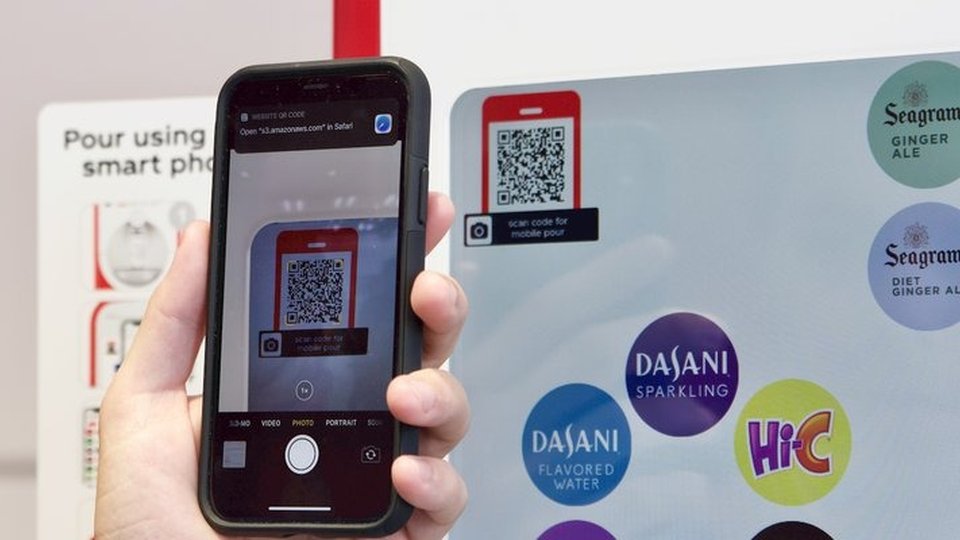Payments
Convenience drives touchless payments as sanitation concerns subside
COVID concern has largely subsided, but many customers continue to appreciate the convenience of scanning a QR code when making a purchase at a vending machine, beverage brewer or micro market kiosk.

July 10, 2023 by Elliot Maras — Editor, Kiosk Marketplace & Vending Times
The QR code has taken on greater importance in convenience services since COVID hit the industry like a thunder bolt in March of 2020.
When locations closed by the hundreds of thousands, equipment manufacturers scrambled to introduce solutions that allowed customers to place and pay for orders without having to touch a display screen. Many convenience services operators embraced the solutions in an effort to appease customer concerns about COVID exposure.
Many locations that remained open during COVID wanted to reduce touch points in their break rooms. During the 2020 Self Service Innovation Summit, one panelist cited a survey that found 82% of consumers found touchscreens unhygienic and would find a touchless solution more hygienic.
COVID concern has since largely subsided, but many customers continue to appreciate the convenience of scanning a QR code when making a purchase at a vending machine, beverage brewer or micro market kiosk.
A random survey of convenience services operators and equipment suppliers by Vending Times indicated the ease of using a QR code is what makes the solutions popular with customers rather than sanitation concerns.
Convenience trumps sanitation
 |
Albert Gonzalez |
"That was a good sales pitch back when it was a thing," Albert Gonzalez, area supervisor and sales manager at Best Office Coffee Service in Miami, said in a phone interview. His company introduced the Azkoyen brewer that featured "air touch" technology, enabling customers to activate a button while holding their finger from up to two centimeters from the surface.
"Back when people thought that by touching a surface, they were going to get a COVID 19 and everybody was on that trend. But as time has passed, I don't even mention it anymore."
The machine has, nevertheless been a great selling tool for Gonzalez, mainly because it makes an excellent cup of coffee.
Luke Webster, director of business development at Newco, a brewer manufacturer, believes the QR code feature his company introduced during COVID remains an important benefit.
The user places their cup on the machine's drip tray, points their smartphone camera at the QR code, views the menu displayed on their smartphone, selects their drink, size and strength, then presses a button and another QR code appears on the phone. That QR code then allows them to activate brewing.
 |
Luke Webster |
"I think it's still a concern," Webster said. "Depending on the situation, people want to have the capability to use that…it's still a way to reduce any kind of sanitary issues in locations like medical offices and things like that."
Webster nevertheless agreed that the level of sanitation concern has tapered off since the pandemic.
Operators on board
Most convenience services operators interviewed concurred.
"I think originally we kind of played on that one (sanitation) but now it's definitely more a convenience factor than anything," said Jodi Glimpse, co-owner of Camelback Vending in Phoenix. "I haven't had conversations about that (sanitation) in probably a year. It did, however, stimulate interest in touchless technology."
Glimpse continues to offer mobile beacons and PicoMarkets from 365 Retail Markets, both of which allow the customer to use their smartphone to select and pay for products.
 |
Jodi Glimpse |
The mobile beacon, powered by a Bluetooth connection, allows customers to scan and pay directly from their mobile devices.
"It's really there for that smaller account that nobody's going to give a market to, and we're willing to take a chance on it and see how it does without having a massive investment into equipment," Glimpse said with regard to mobile beacons.
The PicoMarket is a tabletop, self-checkout kiosk that features a barcode scanner that allows users to pay by waving their smartphone against the scanner in addition to credit, debit, mobile wallet and cash payments.
Ryan McWhirter, vice president of product management at 365 Retail Markets, a supplier of micro market solutions and other self-serve technology, said COVID created another reason for offering touchless technology.
Historical perspective
 |
Ryan McWhirter |
"That said, this touchless transaction capability existed well before COVID and has always been seen as a convenience/speed feature," McWhirter said. "COVID created yet another reason why touchless mattered, but it was already in place prior…we are still growing that type of payment and COVID is not really a factor that we hear about related to using touchless transactions."
During COVID, Snacks Plus Vending in Gwinner, North Dakota, actually had a location close its five micro markets and did not wish to reopen until a touchless solution could be offered.
The company installed nanomarkets, a tablet based device from 365 Retail Markets that allows users to scan a QR code to identify themselves and pay for their purchases, said Dan McKeever, owner of Snacks Plus Vending.
 |
Dan McKeever |
Snacks Plus Vending also introduced some water dispensers that allowed customers to order using gesture recognition, but these units proved problematic. Depending on where the machine was placed, motion sensors sometimes caused the machine to dispense water at an inappropriate time. McKeever attributed this to companies introducing technology prematurely.
"We've disabled that," he said with regard to the water dispensers. "All of these companies (manufacturers) were just chasing their tails trying to come up with something."
Touchless tech improves
McKeever is pleased with the recently introduced Stockwell 2.0 from 365 Retail Markets that features dual temperature zones and allows the user to unlock the door using their smartphone and pay using credit card, tap-to-pay or the 365 Retail Markets payment app. A camera captures what is taken and returned to the machine.
"At the time when COVID first came out they (customers) thought if you were within a thousand feet of anybody you'd get COVID," McKeever said. "That was a huge thing. I don't think it's as much of a selling point any more as it used to be."
Sanitation key in medical locations
Unsurprisingly, sanitation remains a concern for medical locations, said Drew Patterson, regional account manager at Zink Foodservice in Springdale, Ohio, which serves a number of hospitals.
 |
Drew Patterson |
"Yes, everyone is looking for hands-free options in all types of services," Patterson said. "We are seeing a huge push in the hand-free faucet, soap and towel dispersions, as well as some of our automation (an automated coffee bar that uses robotic technology) that has a complete hands-free ordering option if they use the phone app. We also have a condiment dispenser that is hands-free as well.
"I see this trend only picking up as people are becoming more and more aware of germs and want ease of use."
Operator skeptism remains
Not all operators agree there is a significant demand for touchless equipment.
 |
Patrick Sheehan |
"They are not in demand in our market whatsoever," Patrick Sheehan, president of Sheehan Brothers Vending in Springfield, Ohio. "The touchless feature on certain coffee and water equipment was a request we got for two weeks during the height of COVID in 2020 and then was never brought up again."
Sheehan also said some of the early touchless equipment created some issues for customers. "It actually hurt the performance and customer service experience in some cases when we tried implementing it," he said.
Jeff Parks, senior vice president of retail operations at Chattanooga, Tennessee based Five Star Food Service Inc., agreed. He has not seen a lot of app based ordering in the 4,000 or so micro markets the company operates, nor in the more than 40,000 vending machines.
There was a lot of customer interest about sanitation during the pandemic, he said, but remote ordering technology was not high on the company's list of precautionary measures at the time.
 |
Jeff Parks |
During COVID the company took temperatures of employees and required people to wear face masks and gloves. Customer locations also required temperature checks. The main precaution was the requirement to wash your hands. They also provided anti-bacterial spray.
The company also used copper styluses on kiosks, vending machines and coffee service machines.
Five Star Food Service did offer some bean-to-cup coffee machines where the customer scanned a QR code on the brewer screen, but this was not completely touchless since the customer still had to touch the cup, the lid and the stir stick.
Gary Arwin, an Orlando, Florida-based convenience services operator who has been offering phone-based ordering for more than a decade, has yet to witness a groundswell response among his customers.
 |
Gary Arwin |
His company, Gator Refresh, was one of the first operations to introduce the PayRange, a mobile payment app that enables credit card, gift card cryptocurrency and loyalty rewards payments. Out of about 450 machines that can accept PayRange, between 75 and 100 are witnessing weekly activity.
Arwin thinks more aggressive customer education might encourage greater use. He thinks the ability to accept loyalty rewards in particular could stimulate customer interest.
"I think people are used to that now," he said, pointing to the expansion of restaurant rewards programs. "When PayRange first came out, that wasn't very prevalent at all… I think as time has gone on, that's more prevalent. People are looking for that. They want to be rewarded. They want to feel special. They want to feel their purchase matters and the company cares about them."
Head shots provided by interviewees and LinkedIn.
About Elliot Maras
Elliot Maras is the editor of Kiosk Marketplace and Vending Times. He brings three decades covering unattended retail and commercial foodservice.
 ChatGPT
ChatGPT Grok
Grok Perplexity
Perplexity Claude
Claude






